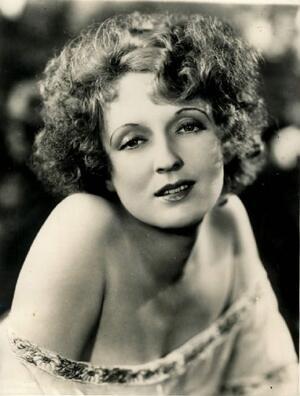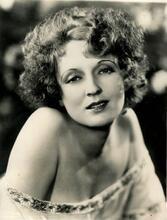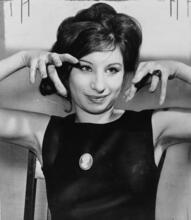Carmel Myers
Carmel Myers, born in San Francisco, California, on April 9, 1900, left a lasting impact on Hollywood as an actress and lavish entertainer. In a Hollywood that encouraged assimilation, she never denied that she was Jewish. She performed in over seventy films and became known for her vamp roles in silent films and “talkies.” Her most notable performance was as the seductive Iras in the 1926 production of Ben Hur. She also hosted a television talk show out of her home in 1951 and distributed French perfume.
Carmel Myers acted in over seventy films, was an early television talk-show host, led a production company that packaged radio and television shows, held a patent for an electronic synchronizer that controlled studio lights, and imported and distributed French perfume. In a Hollywood that encouraged assimilation, she never denied she was Jewish. When offered work by Samuel Goldwyn on the condition that she change her name, she responded, “Oh, Mr. Goldfish, if my career depends upon my hiding the fact that I was born a Jew, I’d rather not have one.”
Early Life and Family
Carmel Myers was born in San Francisco, California, on April 9, 1900. Her parents, Rabbi Isadore and Anna (Jacobson) Myers, moved in 1905 to Los Angeles, where Carmel attended Los Angeles High School and studio schools. She and her brother Zion, a screenwriter, were named for the two holy mountains of Israel. Her father, born in Russia but raised and educated in Australia, was active in campaigns for woman suffrage, abolition of capital punishment, and Zionism. He also was a noted scholar. His character and her mother’s careful nurturing of her career led to a life without stereotypical Hollywood behavior.
Acting Career
Myers was working for L-KH Studios in low-budget comedy shorts in 1916 when her father became an unpaid religious consultant for D.W. Griffith’s Intolerance. Primed by his wife, Rabbi Myers asked for Griffith’s help with his daughter’s career. After a test reading, Griffith hired her as a contract player for fourteen dollars per week. Contrary to later reports, she did not appear in Intolerance. When her employment with Griffith ended, she impressed Carl Laemmele with her reading of a Sarah Bernhardt poem about the death of two sons. Laemmele, who had just lost a beloved nephew, was touched by the subject (but not her reading). Nevertheless, she received a seventy-five-dollars-a-week contract at Laemmele’s Universal Studios. She married lawyer-songwriter I. Kornblum in 1920 and divorced him in 1923.
Myers often played a vamp against the top male stars of the era, beginning in A Daughter of the Poor in 1917 and ending with cameos in Gus and Won Ton Ton, the Dog That Saved Hollywood (both 1976). Among her numerous accomplishments were: two-a-day at the Palace Theater in the heyday of vaudeville; a year in Sigmund Romberg musicals, most notably The Magic Melody; short fiction and a self-help book, Don’t Think About It (1952); guest appearances on television; an early television talk show, The Carmel Myers Show (1951), hosted from her Park Avenue apartment; and television commercials.
Myers’s best known role as Iras in Ben Hur (1926) included a nine-month stint in Italy. In Rome, she met Zelda and F. Scott Fitzgerald, with whom she and Ralph Blum, a lawyer and entertainment executive, became close friends. Zelda and Scott often stayed with Myers in Hollywood, and two of Fitzgerald’s poems written in her guest book testify to that friendship. The shorter one is:
Orange pajamas and heaven’s guitars
Never, oh never, the twain shall meet
Never mind, though; the advantage is ours
Reach for a Carmel instead of a sweet
Personal Life: Wife, Mother, and Hostess
Myers and Ralph H. Blum married in 1929 and had three children: writer and cultural anthropologist Ralph H. Blum (b. 1932) and two adopted daughters, actor Susan Adams Kennedy (b. 1940) and television producer Mary Cossette (b. 1941). After their marriage, they purchased Gloria Swanson’s Sunset Boulevard house, and Myers gradually withdrew from films to raise a family. She was a gracious, accomplished, and highly regarded hostess who could arrange dinner parties for three hundred guests at the last minute. She and her husband entertained lavishly and popularized the A and B party-list concept. So extensive was their circle of friends that Cary Grant and Dana Andrews once appeared on the B list for a dinner honoring Ethel Barrymore and Somerset Maugham. They were, however, present for the concert half of the evening that featured Leonard Bernstein. Myers was widowed in 1950 and married film executive Alfred W. Schwalberg in 1951. She was widowed for the second time in 1974.
Carmel Myers’s personal life bore no resemblance to her screen persona, the wicked woman she portrayed in so many films. One publisher even refused her memoirs on the grounds that there had been no scandal in her life. In her autobiography Sunshine and Shadow, Mary Pickford relates a touching and illustrative encounter with Myers, whom she aptly describes as her “friend ... beautiful, talented, and of rare intelligence and character.” Pickford made a thoughtless and intolerant remark about German Jews and their fate at Hitler’s hands. Myers’s calm retort was, “You must never forget that before we are Jewish or gentile, we are all human beings.” Remorse for her insult motivated Mary Pickford’s four decades of devotion to the Los Angeles Jewish Home for the Aged.
Carmel Myers died on November 9, 1980, in Los Angeles, of a heart attack. The day before she died, she appeared at I. Magnin to endorse her perfume line.
Adams, Val. “Format: A Ukulele and a Memory.” NYTimes, September 9, 1951.
AJYB (1903–1904, 1905–1906, 1921–1922, 1922–1923).
Barbanel, Josh. “Carmel Myers, Silent Movie Star Who Played Wicked Women, 80.” NYTimes, November 19, 1980, A31.
Belcher, Jerry. “Carmel Myers, 80, Leading Lady of Silent Films, Dies.” Los Angeles Times, November 11, 1980.
Blum, Ralph H. Telephone interview by author, November 28, 1996.
Burtis, Liz. “Vamp of Silent Films Revisits Old Haunts.” Los Angeles Mirror News, July 22, 1956.
Byrne, Julie. “Valentino Inspired Smell of Success.” Los Angeles Times, March 7, 1968, IV: 1, 13.
“Carmel Myers.” Variety, November 12, 1980.
“Carmel Myers Buys Hellinger Stories for Radio Series.” Variety, August 13, 1952.
“Carmel Myers Head [sic] TV-Radio Company.” Hollywood Reporter, September 30, 1952.
“Carmel Myers Patents TV Lighting Method, Hurdles ‘Can’t Do It.’” Variety, December 5, 1951, 1.
Champlin, Charles. “In Memoriam: Farewell to Notables in the Arts.” “Calendar,” Los Angeles Times, December 28, 1980, 2.
Cossette, Mary. Telephone interviews by author, November 18, 1996 and December 11, 1996.
Cuskelly, Richard. “Silents Star Carmel Myers: ‘I’m Recycling My Life.’” Los Angeles Herald Examiner, September 1974.
Flynn, Joan King. “How to Beat the Blues.” American Weekly, Los Angeles Examiner, April 13, 1953.
“From ‘Ben Hur’ to ‘Won Ton Ton.’” Hollywood Reporter, 46th anniversary ed., September 1977, 30+.
Kingsley, Grace. “Tea-cup Tete-a-tete with Stella, the Star-Gazer.” Los Angeles Times, March 3, 1925, 10.
Kramer, William M., and Norton B. Stern. “Mary Pickford: From a Moment of Intolerance to a Lifetime of Compassion.” Western States Jewish Historical Quarterly 13, no. 3 (1981): 274–281.
“L.A. High School Girl Makes Debut as Star in ‘Sirens of the Sea,’” Los Angeles Evening Herald, September 18, 1917: 17:7.
“Looking Back: Carmel Myers.” Hollywood Reporter, June 5, 1990.
“Marriages.” Variety, October 31, 1951.
Pickford, Mary. Sunshine and Shadow (1955); UJE: 71–72.
Robertson, Nan. “Movie Star of Twenties Now Promotes Perfume.” NYTimes, April 23, 1959, 24.
Sullivan, Ed. “The Half World of Those Who Survive Their Mates.” Hollywood Citizen News, June 15, 1950.
Slide, Anthony. “Silent Stars Speak.” Films in Review 31. no. 3 (March 1980) 129–141.
Thomas, Kevin. “Carmel Myers: Vamp to Video.” Los Angeles Times, January 21, 1975, and “Carmel Myers: Always a Glamorous Personality.” “Calendar,” Los Angeles Times, November 16, 1980, 2; WWIAJ (1926, 1938).





